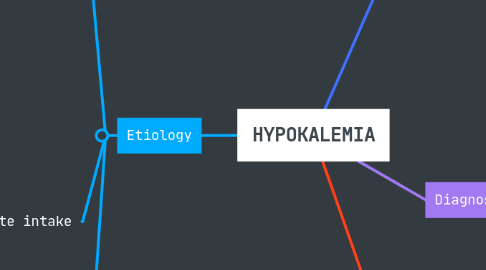HYPOKALEMIA
por Jennifer Harp


1. Etiology
1.1. abnormal losses
1.1.1. medications
1.1.1.1. diuretics
1.1.1.2. laxatives and enemas
1.1.1.3. corticosteroids
1.1.2. gastrointestinal losses
1.1.3. renal losses
1.1.3.1. osmotic diuresis
1.1.3.2. mineralocorticoid excess
1.1.3.3. types I and II renal tubular acidosis
1.1.3.4. polydipsia
1.1.3.5. intrinsic renal transport defects
1.1.4. hypomagnesemia
1.1.5. dialysis/plasmapheresis
1.2. inadequate intake
1.2.1. anorexia
1.2.2. dementia
1.2.3. starvation
1.2.4. total parenteral nutrition
1.3. transcellular shifts
1.3.1. medications
1.3.2. alkalosis
1.3.3. refeeding syndrome
1.3.4. increased beta2 adrenergic stimulation
1.3.5. thyrotoxicosis
1.3.6. familial hypokalemic periodic paralysis
1.3.7. hypothermia
